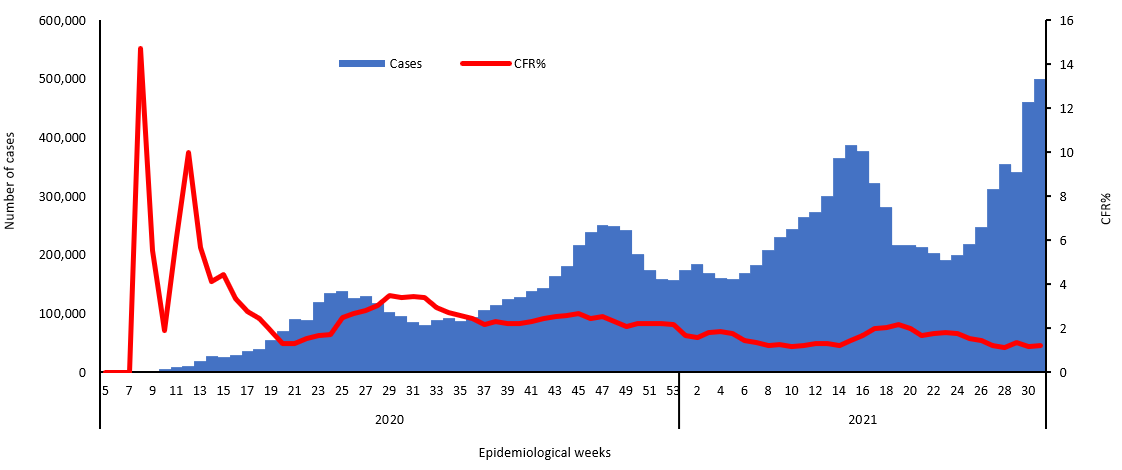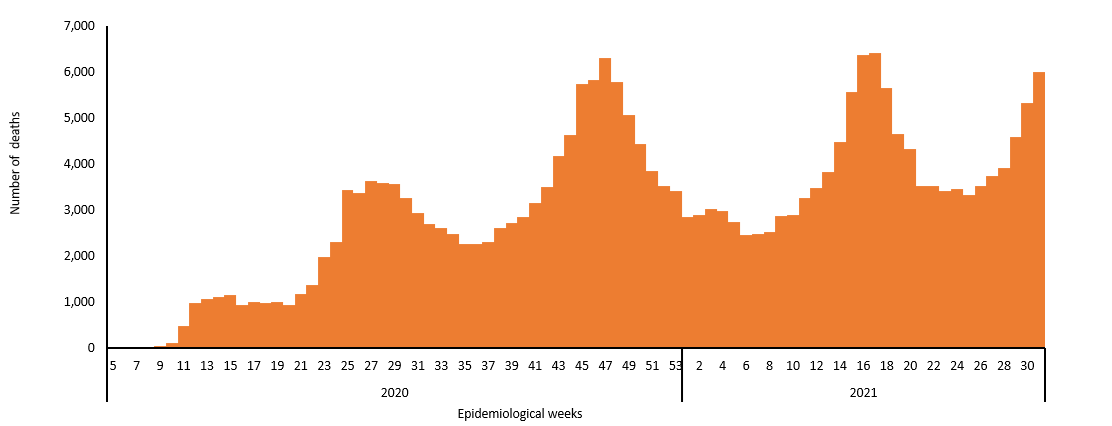The coronavirus disease COVID-19 continues to spread at the regional and global levels. As of 7 August 2021, the global cumulative incidence reached 201 516 060 reported cases and 4 276 254 associated deaths with a case fatality ratio (CFR) of 2.1%. Meanwhile, the 22 countries of the Eastern Mediterranean Region (EMR) have reported a total of 13 108 707 cases, which represent about 6.5% of the global count, with 242 575 associated deaths (CFR 1.9%). Most countries in the Region are in the community transmission phase.
Since the beginning of the outbreak, the country that has reported the highest number of total cases in the Region is Islamic Republic of Iran (4 119 110 cases; 31.4% of the Region’s total), followed by Iraq (1 704 363; 13%) and Pakistan (1 067 580; 8.1%). Islamic Republic of Iran also reported the highest number of total associated deaths (93 473; CFR 2.3%) followed by Pakistan (23 865; CFR 2.2%) and Tunisia (21 025; CFR 3.4%). The highest CFRs were reported by Yemen (19.4%) followed by Sudan (7.4%), while the lowest CFRs were reported by Qatar (0.26%), United Arab Emirates (0.29%) and Bahrain (0.51%).
During epidemiological week 31, the Region reported an increase in cases of 8.7% when compared to the previous week (499 794 cases compared to 459 618 cases). Similarly, an increase of 12.8% was observed for associated deaths (5995 deaths compared to 5313 deaths).
Morocco, Islamic Republic of Iran and Libya reported a relative increase in COVID-19 activity in week 31. The cumulative number of cases increased from 623 528 to 687 292 in Morocco (a 10.2% weekly increase), from 3 871 008 to 4 119 110 in Islamic Republic of Iran (a 6.4% weekly increase) and from 253 436 to 267 846 in Libya (a 5.7% weekly increase). Libya, Morocco and Tunisia had the largest relative increase in deaths.
In terms of testing, a total of 195 859 784 laboratory PCR tests were conducted since the start of the outbreak across the Region including 4 701 198 tests in week 31, which shows a 9.3% decrease compared to the previous week when 5 180 698 tests were conducted. The highest number of PCR tests were reported from United Arab Emirates (67.6 million), followed by Islamic Republic of Iran (26.4 million) and Saudi Arabia (25.7 million). The United Arab Emirates and Bahrain are performing the highest rates of testing per capita (6768/1000 and 3177/1000, respectively). The average positivity rate for the Region is 6.7%. WHO recommends a positivity rate of around 3–12% as a general benchmark indicating adequate testing, which was achieved in most countries of the Region.
Meanwhile, COVID-19 vaccination continues across the Region. The total number of doses administered so far in the 22 countries is 155 193 844. Pakistan has administered the highest number of doses at 36 331 025 followed by Saudi Arabia at 29 559 987and Morocco at 25 933 900. On the other hand the total number of administrated doses in Sudan is 819 035, in Libya is 737 417, in Yemen is 311 483, in Somalia is 279 869, in Syria is 108 276 and in Djibouti is 26 796.*
Supporting countries in the Region
The regional incident management support team continues to coordinate the response and provide technical support to countries and partners in the Region in the areas of coordination and partnership, surveillance, laboratory capacity, clinical management, infection prevention and control, risk communication and community engagement, points of entry according to the International Health Regulations (2005), research, health systems, and essential health services among others.


For more data from the Region, please visit the COVID-19 dashboard.
*The data on vaccination is obtained from a number of sources including media reports and country websites for ministries of health.
Subscribe to the monthly infectious hazard preparedness newsletter of WHO’s Health Emergencies Programme for latest data and analysis on epidemic- and pandemic-prone diseases, as well as news on outbreak preparedness and response within WHO’s Eastern Mediterranean Region.



